Maths
Maths can look like this.......
Mathematics- ‘do it, twist it, deepen it’
intent
We are entering our fourth year of teaching Maths Mastery after completing the TRG (Teacher Research Group) with the Maths Hub over a two year duration, this was alongside completing the ‘Firm Foundations’ within Mastery for our Early Years. Last year we worked alongside the Maths Hub to complete our ‘Sustaining Year’. With an additional focus on enhancing teacher knowledge, our EY Lead completed a PD Lead course in ‘Numerical Patterns’. This year, teachers across all three year groups will complete the ‘Mastering Number’ programme in order to promote ‘Fluency’ even further within our school, and this will be completed alongside the ‘SKTM’ which will focus on the subject knowledge and pedagogy of key topics within Maths Mastery. We chose Maths Mastery as an approach because each session equips children with the skills of fluency, reasoning and problem solving that they need in life beyond school. Opportunities for deepening understanding are built into the curriculum, with challenge for rapid graspers, and scaffolds to support struggling learners. Conceptual understanding is taught in tandem with procedural fluency in order to embed mathematical thinking. Children then apply their understanding through real-life problem-solving activities. Progression is planned for and key skills revisited regularly.
/424CEB39A94DB23B6115903E1ABCBD20.jpg)
We believe that the Essential Characteristics of Mathematicians include:
- An understanding of the important concepts and the ability to make connections within mathematics.
- A broad range of skills in using and applying mathematics.
- Fluent knowledge and recall of number facts.
- To demonstrate initiative in solving problems within a wide range of contexts, including the new or the unusual.
- The ability to think independently and to persevere when faced with challenges, showing a confidence of success.
- To be able to embrace the value of learning from mistakes and false starts.
- To reason, generalise and make sense of solutions.
- Fluency in performing written and mental calculations and mathematical techniques.
- Use a wide range of mathematical vocabulary.
- A commitment to the passion for the subject.
IMPLEMENTATION
Maths is taught regularly throughout the week and lessons are taught discretely through a mastery approach. We believe that the three aims of the National Curriculum should be addressed every day, Fluency, Reasoning and Problem Solving.
Lessons begin with a problem, instead of ‘Let me teach you …’ as a starting point, children are encouraged to explore the problem themselves. This is referred to as the ‘anchor task’. Children then practice on whiteboards before attempting the ‘do it, twist it, deepen it’ elements of the lesson within their practice books. Although this might look a little different in Early Years, children are still encouraged to explore problems through an ‘anchor task’ and this is then reinforced through the indoor/outdoor environment and enhancements.
Within Key Stage 1 lessons are designed for mixed ability groups, scaffolding is provided by way of support, concrete apparatus and links to previous learning. There is also an expectation that all children can achieve depth at some point within the lesson.
We access the Power Maths scheme of learning and more recently White Rose, amongst other material, and the 'Ready to Progress' guidance to inform our long term overview and planning for Maths. We now spend longer on topic areas, rather than revisiting topics term on term. We recognise that a lack of fluency skills can be detrimental to the progress children make when accessing problem-solving activities. To address this we build in Retrieval Practice on a weekly basis to ensure fluency skills are revisited and embedded and links to previous learning built upon.
To support our children’s understanding of mathematical concepts teachers plan for rapid intervention for those that have struggled to grasp a concept. This is delivered prior to the next maths lesson, often on the same day the misconception occurred.
impact
- Progress is evidenced through daily assessment for learning opportunities, marking, pupil observations and discussions.
- Work in books is of a good quality for their age and ability.
- Child friendly assessments at the end of each term are used to provide a current snap shot of what they have learnt and remembered.
- KS1 SATs tests demonstrate knowledge and skills taught within a test situation.
- Monitoring within school demonstrate pupils can apply taught mathematical skills independently.
- Pupils talk with passion during pupil conferencing about their learning in Maths.
As a staff team we are committed to continuous improvement. We have been working closely with the Central Maths Hub and the National Centre for Excellence in the Teaching of Mathematics (NCETM) to move our teaching practices forwards. We are part of the TRG (Teacher Research Group) which involves working alongside Primary Maths Mastery Specialist for our local area- Craig Flanagan/Nikki Powell and Helen Hackett.
The key elements of teaching for mastery can be found HERE
Continuous provision within Maths
- The term ‘continuous’ indicates an expectation to re-visit skills and concepts many times during the year, throughout the key stage and across the school. This gives children the best opportunity to achieve a greater depth of learning and Mastery.
- Continuous provision is a well established EYFS teaching method and is now steadily becoming embedded into KS1. Chris Quigley is an advocate in the development of continuous provision up to year 6 and staff have received bespoke training from his organisation which have inspired us to commit to continuous provision as a key teaching method.
The aim is not to ‘achieve’ learning in a lesson as if this is a final destination. Instead, pupils should have multiple opportunities to return to content, over time, in order to gain a growing developmental understanding. (Chris Quigley)
Longitudinal Learning in Maths
The longitudinal learning in Maths is designed to help pupils to revisit ideas and concepts in a variety of situations and to slowly develop an understanding over time. We encourage pupils to repeat the curriculum as many times as possible, in as many different ways as possible so that they develop a gradual and developmental understanding of knowledge, skills and behaviours.
Learning takes much longer and requires multiple re-visits in a range of diverse contexts. The attainment targets of the National Curriculum don’t expect fluency in the matters, skills and processes outlined in the Programmes of Study until the end of the key stage. (Chris Quigley)
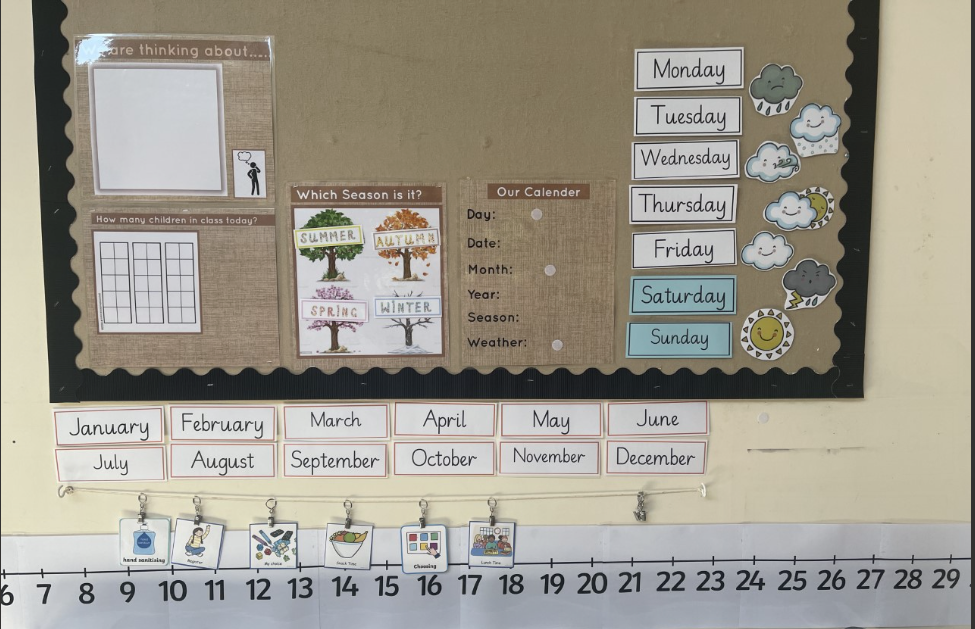
Enquiry Based Learning /E341263B2B41FC3B38390F28C212C11B.jpg)
Children who are curious are destined for success. A curious child is motivated to ask questions, seek answers, and apply those answers to his or her personal experience. We believe, that given the right conditions, every child in our school can demonstrate curiosity, an attitude of wonder, and a desire to discover.
Curiosity and motivation lie at the heart of Enquiry-based Learning. This approach to learning drives our curriculum and ensure our classrooms are high-energy learning centres, where children are excited to learn and participate. Along with rich content, it allows our children to ask themselves three questions about any new subject being introduced: What do I already know about the subject?... What do I want to know about the subject?... What have I learned about the subject?...
During Enquiry-based Learning many subjects, including Maths, are intertwined in order to answer the original questions children pose, but the skills for progression are carefully considered within each subject across each year group in order to ensure depth of learning. We recognise that there is a need for the direct teaching of discrete skills and knowledge and this is balanced carefully within each Enquiry and the teaching day.
Maths in the Early Years
/6CBBD25F2B9745821DF36908E4D17083.jpg)
There are six main areas that collectively underpin children’s early mathematical learning, and which provide the firm foundations for the maths that children will encounter as they go up the years in primary school.
They are:
- Cardinality and Counting: understanding that the cardinal value of a number refers to the quantity, or ‘howmanyness’ of things it represents.
Click HERE - Comparison: understanding that comparing numbers involves knowing which numbers are worth more or less than each other.
Click HERE - Composition: understanding that one number can be made up from (composed from) two or more smaller numbers.
Click HERE - Pattern: looking for and finding patterns helps children notice and understand mathematical relationships
Click HERE - Shape and Space: understanding what happens when shapes move, or combine with other shapes, helps develop wider mathematical thinking
Click HERE - Measures: comparing different aspects such as length, weight and volume, as a preliminary to using units to compare later.
Click HERE
Below are the Overviews for Year 1 and Year 2
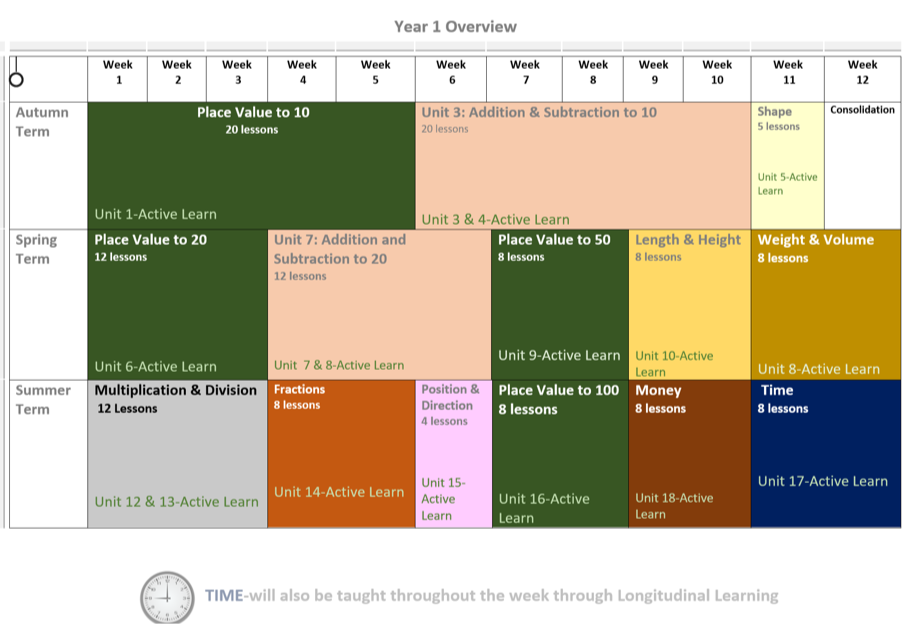
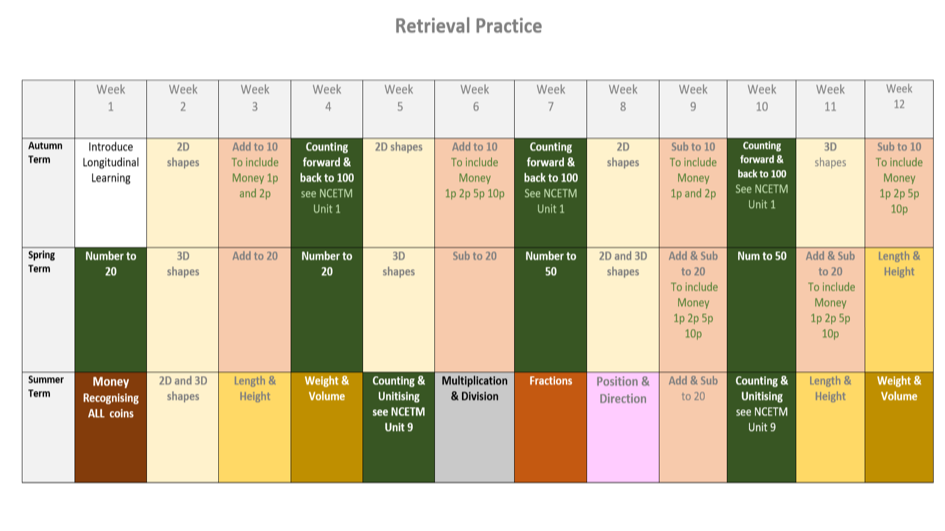
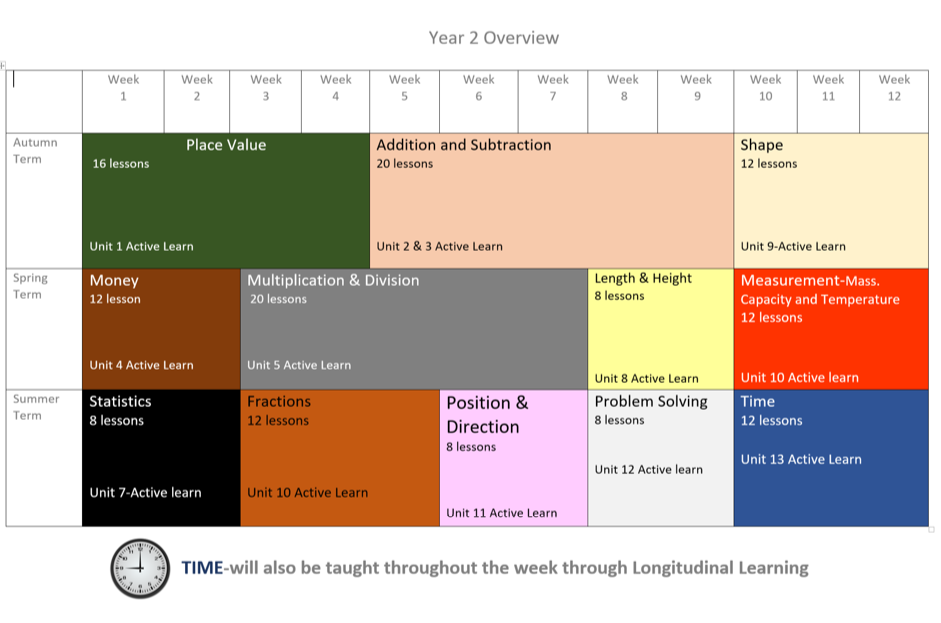
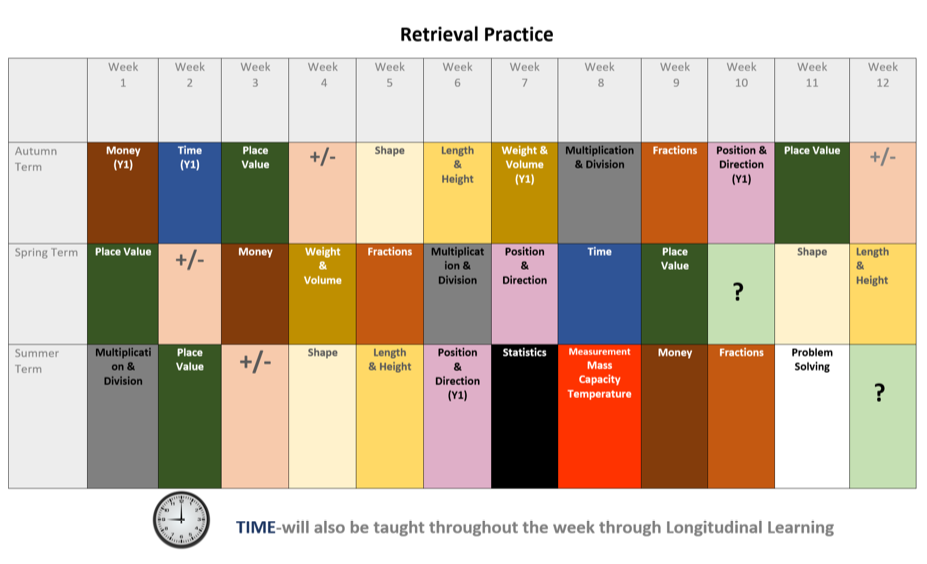

/795FCB801823F9169CE9EE1FB9034B25.JPG)



/2F852788EB9958830755EEA82381EA1F.png)
